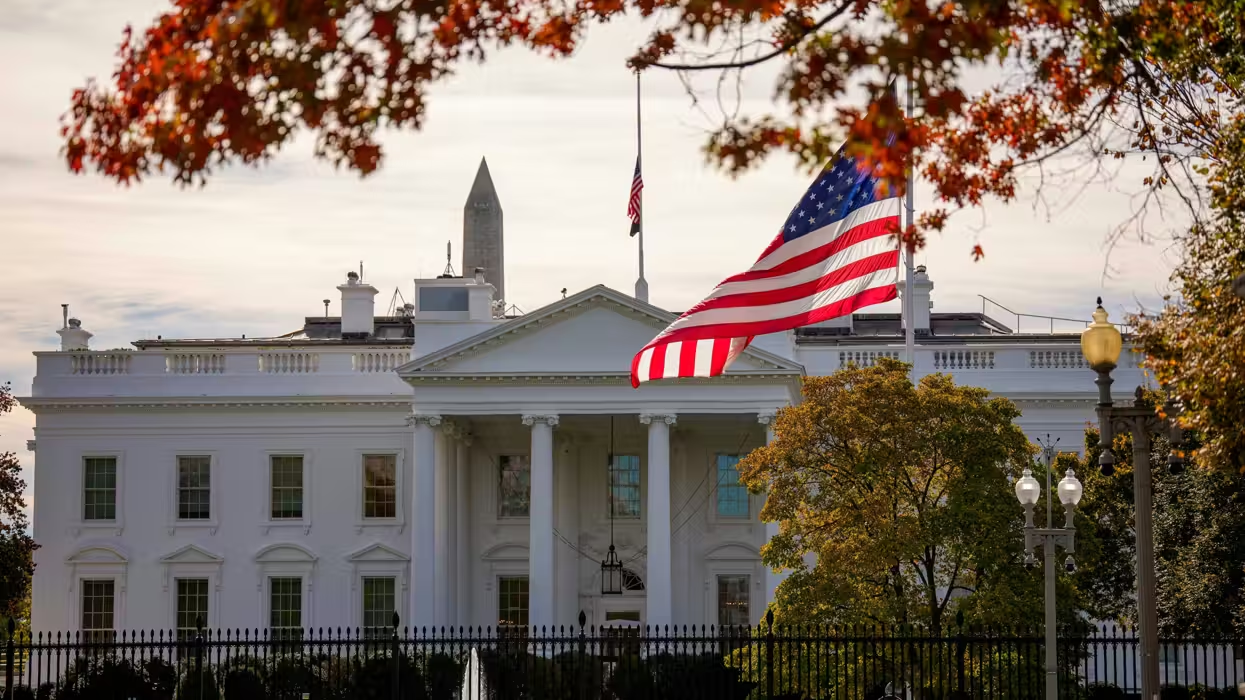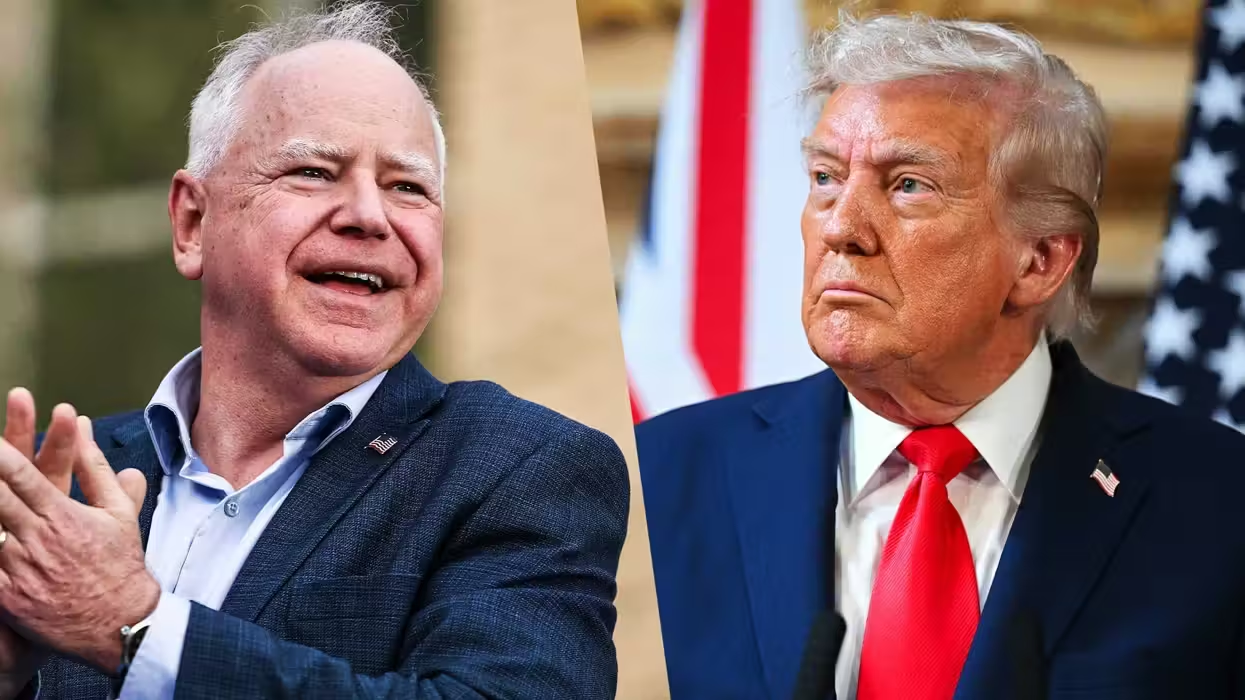
© 2025 Blaze Media LLC. All rights reserved.
The 12 most compelling quotes from British MEP Daniel Hannan's Inventing Freedom
December 02, 2013
Below are the 12 most compelling quotes from British MEP Daniel Hannan's newly released Inventing Freedom: How the English-Speaking Peoples Made the Modern World. Be sure to check out our comprehensive review and interview if you missed them too.
1. "What, after all, do we mean by Western Civilization?...There are three irreducible elements. First the rule of law. The government of the day doesn’t get to set the rules. Those rules exist on a higher plane and are interpreted by independent magistrates. The law, in other words, is not an instrument of state control, but a mechanism open to any individual seeking redress.
Second, personal liberty: freedom to say what you like, to assemble in any configuration you choose with your fellow citizens, to buy and sell without hindrance, to dispose as you wish of your assets, to work for whom you please, and, conversely, to hire and fire as you will.
Third, representative government. Laws should not be passed, nor taxes levied, except by elected legislators who are answerable to the rest of us.
Now ask yourself how many countries that are habitually labeled Western have consistently applied those ideals over, say, the past century. How many have an unshakable commitment to them even today?" Inventing Freedom, (pg. 4)
[instory-book ISBN="9780062231734"]
2. "Elected parliaments, habeas corpus, free contract, equality before the law, open markets, an unrestricted press, the right to proselytize for any religion, jury trials: these things are not somehow the natural condition of an advanced society. They are specific products of a political ideology developed in the language in which you are reading these words. The fact that those ideas, and that language, have become so widespread can make us lose sight of how exceptional they were in origin." Inventing Freedom, (pg. 10)
3. [After describing what visitors typically think of when it comes to Great Britain and the U.S.] "In neither case are they likely to identify the truly extraordinary feature, namely that the lawmakers are answerable to everyone else, and that governments change peacefully as a result of popular votes." Inventing Freedom, (pg. 11)
4. "Is it fanciful to posit a direct connection between the English language and the distinctive political system of the Anglosphere? I don’t think so. Most of the libertarian lexicon was originally English…The English language has been a vehicle and a guarantor of liberty down the centuries." Inventing Freedom, (pgs. 32-33)
5. "Neither side [Americans or Brits] used patriot to mean someone who favored American over British interests. Not until much later did novelists and scriptwriters start pretending that the word had been employed that way. The notion of an exclusively American patriotism was born after 1776. Before then, a patriot was someone, on either side of the Atlantic, who was determined to preserve the libertarian exceptionalism of the English-speaking polity against its enemies, internal or external…The Patriots of the 1770s were indeed fighting for British ideals, just as their descendants were to do in Lady Astor’s time. These ideals—free elections, habeas corpus, an uncensored press, and the rest—are now universally acknowledged, if by no means universally applied. It is easy, these days, to be complacent, to assume that every nation moves in the direction of liberal democracy when it becomes wealthy enough, educated enough, and secure enough. It takes a real mental wrench to see the world from the perspective of August 1941, when the vast bulk of humanity lived under totalitarian governments." Inventing Freedom, (pg. 52)
6. "Anglo-Saxon values, as Richard Dawkins might put it, are a meme rather than a gene. They can be transmitted without any genetic vehicle. They explain why Bermuda is not Haiti, why Singapore is not Indonesia, why Hong Kong is not China (and, for that matter, not Macau).
These precepts had their genesis in the earliest Anglo-Saxon settlements, in the dark years, violent and unchronicled. From that era came three interrelated concepts that were to transform humankind. First, the idea of personal autonomy, including in contract and property rights; second, the notion that collective decisions ought to be made by representatives who are answerable to the community as a whole; third, the conception of the law as something more than a projection of the wishes of the ruler, as a folkright of inherited freedoms that bound the King just as surely as it bound his meanest subject.
[sharequote align="left"]Anglo-Saxon values made possible the transformation of our planet over the past three centuries[/sharequote]
Anglo-Saxon values made possible the transformation of our planet over the past three centuries, allowing extraordinary numbers of people to enjoy an unprecedented standard of living. Nowadays, those values are so widespread that we can easily think of them as an inevitable outcome of human development. It takes a major effort of will to imagine how revolutionary they must have seemed when first proposed." Inventing Freedom, (pg. 63)
7. "The idea that an assembly might remove an official—even a king—who had broken the law did indeed have pre-Norman roots. As we shall see, the Anglo-Saxon assemblies, the Witans, had on occasion rejected the claims of their monarchs on grounds of what would now be called abuse of office.
[sharequote align="right"]The law...was a set of inherited rights that belonged to every freeman in the kingdom[/sharequote]
Ponder, for a moment, that astonishing fact. More than a thousand years ago, in England, the precedent had been set that a ruler might be judged before a representative assembly. The law, in other words, was not simply the sovereign’s decree; nor yet was it an interpretation of Holy Scripture. The law, rather, was a set of inherited rights that belonged to every freeman in the kingdom. The rules did not emanate from the government, but stood above it, binding the King as tightly as they bound the poorest ceorl. If the monarch didn’t uphold the ancients laws and customs of his realm, he could be removed.
English-speaking peoples still commonly, and exceptionally, talk of “the law of the land.” Not the King’s law, not God’s law, but the law of the land—a set of rights and obligations immanent in the country, growing incrementally, passed down as part of the patrimony of each new generation." Inventing Freedom, (pg. 65)
8. [On the meetings of witan (“wise men”) which met as early as the 880s] “The representative institutions have their roots in the dark-age and medieval past is not an anachronistic view; rather it is fully demonstrable,” says James Campbell, professor of medieval history at Oxford and an unmatched authority on the late Anglo-Saxon state. “It does indeed look as if the history of constitutional liberty has important beginnings in Anglo-Saxon England.”
J.R. Maddicott, whose Origins of the English Parliament is the standard work on the subject, contrasts the Witan to other European assemblies and concludes that it was qualitatively different in its more representative composition, in its powers of taxation, and, above all, in its survival. “In other parts of the West, the Germanic legislative tradition died out in the tenth century. Its energetic preservation and promotion in England was quite exceptional.” The Witan was not only a partner in royal lawmaking; it was also a guardian of the established law, willing, on occasion, to lay down terms to the King. “We need not baulk,” says Maddicott, “at the notion of English exceptionalism.”
This exceptionalism is most clearly visible in the dynastic disputes of the early eleventh century, before the catastrophe of the Norman Conquest." Inventing Freedom, (pg. 84)
9. "Magna Carta might not be formally on the law books in the United States, but it has been cited more than a hundred times by the Supreme Court.
In 1937, alarmed by what he saw as President Franklin Rosevelt’s unbalancing of the U.S. Constitution, the great Texan jurist Hatton Sumners delivered one of the truest and pithiest statements of American political theory:
[sharequote align="left"]There is a straight road which runs from the Runnymede to Philadelphia[/sharequote]
There is a straight road which runs from the Runnymede to Philadelphia. We did not “borrow” provisions from the British Constitution, which had come from the people; those provisions were ours paid for with the lives of our ancestors on many a battlefield. I have examined the matter. I tell you our Constitution came up from the body of a self-governing people. But we can lose our capacity to govern by its nonexerise." Inventing Freedom, (pg. 116)
10. "This pattern was to continue for centuries: the executive demanding a subsidy, the legislature debating the issue…and eventually agreeing to grant supply in return for the redress of grievances." [The example mentioned was a legislative council approving a tax of 1/15 on movable goods to pay for a French military campaign in exchange for the King reissuing Magna Carta back in 1225.] Inventing Freedom, (pg. 120)
[sharequote align="right"][13th century England] appears to have been... open, mobile, market-oriented and highly centralized[/sharequote]
11. "Quoting Cambridge historian Alan Macfarlane who studied the parish records of medieval England: “What now seems clear is that England back to the thirteenth century was not based on either ‘Community’ or communities.’ It appears to have been an open, mobile, market-oriented and highly centralized nation, different not merely in degree but in kind from the peasantries of Europe and Asia.”…The peculiar individualism of English society was taken for granted in the earliest sources he could find." Inventing Freedom, (pg. 134)
12. "Wars are the ultimate test of nationality. Confronted by a foreign enemy, people of the same nation will quickly forget their domestic quarrels. But the wars that perturbed the English-speaking world in the 1640s did not set state against state…Rather, they carved laterally across all these polities, pushing combatants into one of two camps…there were, broadly speaking, those who fought for monarchy, aristocracy episcopacy, hierarchy, loyalty, and land; and there were those who fought for individualism, Protestantism, representative government, and free trade. These common alignments formed the basis of the Anglosphere that was to emerge from the fighting with a shared political consciousness. They also formed the basis of the two-party system that was common to the Anglosphere from then on." Inventing Freedom, (pg. 169)
Want to leave a tip?
We answer to you. Help keep our content free of advertisers and big tech censorship by leaving a tip today.
Want to join the conversation?
Already a subscriber?
Ben Weingarten is a writer, commentator, and editor at large at RealClearInvestigations. He is a senior contributor at the Federalist and writes columns for Newsweek and the Epoch Times.
Ben Weingarten
Ben Weingarten is a writer, commentator, and editor at large at RealClearInvestigations. He is a senior contributor at the Federalist and writes columns for Newsweek and the Epoch Times.
more stories
Sign up for the Blaze newsletter
By signing up, you agree to our Privacy Policy and Terms of Use, and agree to receive content that may sometimes include advertisements. You may opt out at any time.
Related Content
© 2025 Blaze Media LLC. All rights reserved.
Get the stories that matter most delivered directly to your inbox.
By signing up, you agree to our Privacy Policy and Terms of Use, and agree to receive content that may sometimes include advertisements. You may opt out at any time.






